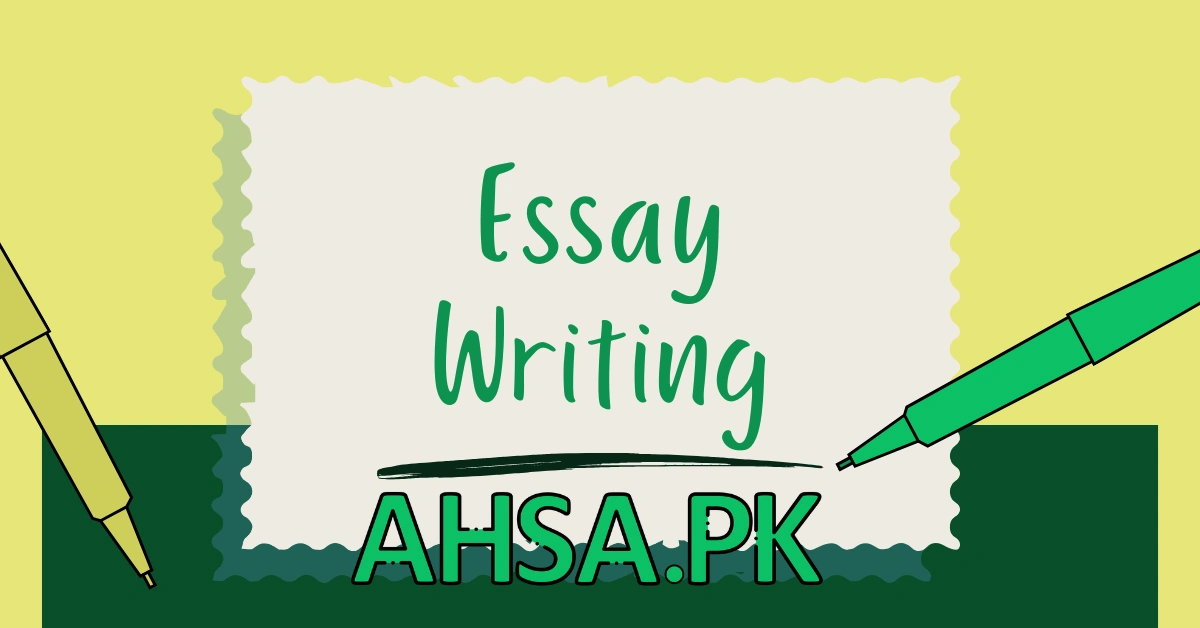Master the art of essay writing with tips on defining scope, organizing ideas, using simple language, and crafting compelling introductions and conclusions. Improve your skills with these practical strategies.
The Art of Essay Writing
Define the scope of the essay.
Before you start writing an essay on a given subject, it is important to define the scope of the subject. It is here that most students falter. They take a too narrow keyword in the title of the essay and write down all they know about it. They hardly realise how much off the track they are. The Problems of Industrialisation and Should Pakistan Be Industrialised are three different essays which need different treatment. The first essay deals with elaborate discussion of the various problems of industrialisation, viz., the availability of raw materials, labour, market, marketing conditions, etc. The second essay discusses the evil effects of industrialism, e.g., the exploitation of the labour, the concentration of wealth in a few hands, pollution of atmosphere, etc. In the third essay, we have to discuss the pros and cons of the problem and decide whether we should try to strengthen our agriculture or go for all-out industrialisation.
Jot down the ideas.
Having defined the scope of the essay, start thinking and jotting down the ideas as they occur to you. But be sure that the ideas that you are jotting down are relevant to the given subject and carry sufficient weight in them. A house cannot be built upon trivialities, nor can a mere jumble of irrelevant ideas make an essay. Long drawn-out illustrations also do-little credit to the composition. Therefore, take care that you include nothing irrelevant or shallow, you do not forcibly stretch your ideas and you do not include long casual-looking illustrations.
Prepare the outlines.
Now it is time to arrange these ideas and prepare your outlines. The arrangement should be logical in a reflective essay and chronological in a narrative or descriptive essay. An event, describe it as it happened. If your subject needs emphasis, arrange them logically. The importance of arranging the ideas cannot be overemphasized. Proper arrangement can often make up even for lack of material. Your essay must have proper arrangement as it is a well-integrated pattern of thoughts.
Think of an attractive beginning.
Now decide how you are going to begin the essay. Your introduction should be fresh, original and arresting, but it should be strictly relevant to the subject. Perhaps you could begin your essay with some observation of your own or with some quotation of a known writer, if you can think of it on the spur of the moment.
The conclusion has to be stated clearly and firmly.
The conclusion of the essay has also to be thought of beforehand. Even before you lay the first brick, you must know how you will put the last one; i.e., you must know how you are going to conclude the essay. In a narrative or descriptive essay, you could sum up with the impact, the person or the event left on your mind. In a reflective essay, you could conclude.
Develop different points in different paragraphs.
With the help of the outlines you have prepared, clearly develop your thoughts point by point. Your thoughts should show logical development and must not be jumbled. Division of the essay into various paragraphs will help keeping your thoughts unentangled.
Revise it.
Revise it after it is done. A rough draft of your essay is ready. Now revise it if you have time at your disposal. It is a good habit to revise, and in many cases, revising your essay, your aim should be to eliminate repetition of words and phrases, ambiguity of ideas or style, and any digressions that might have crept in.
Never be irrelevant.
The temptation of introducing beautiful ideas or beautiful words and phrases just because they happen to be beautiful should be resisted. Words and phrases, if put out of place, fail to attract. Pertinence of an idea should be the first consideration, not its beauty. Moralising or preaching a sermon is also undesirable. Vague generalizations, arbitrary conclusions, vivid statements, false accusations, and dogmatic assertions should be carefully avoided.
Do not overlook any essay with statistics.
An essay on Bank Nationalisation or Food Crisis might indeed figure to resonate your ideas. But don’t forget that your ideas are the beauty of your expressions. The examiner wants to see the clarity of your ideas and the beauty of your expression. Don’t let statistics destroy the beauty of your essay.
Use simple language.
Try to keep your language simple and elegant. Simplicity is a style virtue. Avoid verbosity, pomposity, and grandiloquity. It is not advisable to write long, complex sentences unless you are confident that you can handle them deftly. Complex sentence structure makes room for ambiguity and grammatical mistakes. Stock phrases and slang should also be avoided.
Develop the habit of reading newspapers and periodicals.
You cannot write a good essay unless you have a good knowledge of the subject, a fairly good vocabulary, and a store of your own views. For extensive knowledge and rich vocabulary, you ought to develop the habit of reading newspapers, periodicals as well as good books. You should not burden yourself to read all books but to appraise what you are reading. You must frequently pause to consider, digest, and criticize.
Unfortunately, very few people develop the habit of thinking.
Modern world discourages rational thinking. Therefore, most of us suffer from paucity of ideas. GK Chesterton has rightly remarked, “None of us think enough of those things on which we agree. Why should the eye be so lazy? Let us exercise the eye until it learns to see the starting facts than run across the landscape as plain as a painted fence. Let us be useful athletes. Let us learn to write the essay on a stray cat or a coloured cloud.” One can learn to write only by writing. So just write on.
مضمون نویسی کا فن
مضمون کا دائرہ کار متعین کریں۔
جب آپ کسی موضوع پر مضمون لکھنا شروع کریں تو سب سے پہلے اس موضوع کا دائرہ کار متعین کریں۔ یہ وہ مقام ہے جہاں زیادہ تر طلبہ غلطی کرتے ہیں۔ وہ مضمون کے عنوان میں ایک بہت ہی محدود کلیدی لفظ لیتے ہیں اور جو کچھ وہ اس کے بارے میں جانتے ہیں اسے لکھ ڈالتے ہیں۔ انہیں شاید ہی احساس ہوتا ہے کہ وہ کتنے زیادہ موضوع سے ہٹ چکے ہیں۔ صنعتکاری کے مسائل اور کیا پاکستان کو صنعتی بنایا جائے؟ تین مختلف مضامین ہیں جن کے لیے مختلف طریقہ کار درکار ہیں۔ پہلا مضمون صنعتکاری کے مختلف مسائل جیسے کہ خام مال کی دستیابی، مزدور، بازار، مارکیٹ کے حالات وغیرہ پر تفصیلی بحث کرتا ہے۔ دوسرا مضمون صنعتکاری کے منفی اثرات جیسے کہ مزدوروں کا استحصال، دولت کا چند لوگوں کے ہاتھوں میں ارتکاز، اور فضائی آلودگی وغیرہ پر بات کرتا ہے۔ تیسرے مضمون میں ہمیں مسئلے کے فوائد و نقصانات پر بحث کرنی ہوتی ہے اور فیصلہ کرنا ہوتا ہے کہ ہمیں اپنی زراعت کو مضبوط کرنا چاہیے یا مکمل طور پر صنعتکاری کی طرف جانا چاہیے۔
خیالات درج کریں۔
مضمون کے دائرہ کار کو متعین کرنے کے بعد، سوچنا شروع کریں اور خیالات کو اس طرح درج کریں جیسے وہ آپ کے ذہن میں آئیں۔ لیکن اس بات کا یقین کر لیں کہ جو خیالات آپ درج کر رہے ہیں وہ دیے گئے موضوع سے متعلق ہیں اور ان میں کافی وزن ہے۔ ایک گھر معمولی باتوں پر تعمیر نہیں کیا جا سکتا، اور نہ ہی غیر متعلقہ خیالات کا ایک مجموعہ مضمون بنا سکتا ہے۔ لمبی اور غیر ضروری وضاحتیں بھی مضمون کی وقعت کم کرتی ہیں۔ اس لیے اس بات کا دھیان رکھیں کہ آپ کچھ غیر متعلقہ یا سطحی نہ لکھیں، اپنے خیالات کو زبردستی نہ بڑھائیں اور لمبے اور بے ترتیب وضاحتی نکات شامل نہ کریں۔
خاکہ تیار کریں۔
اب وقت آ گیا ہے کہ ان خیالات کو ترتیب دیں اور خاکہ تیار کریں۔ عکاس مضمون میں ترتیب منطقی ہونی چاہیے اور بیانیہ یا وضاحتی مضمون میں ترتیب زمانی ہونی چاہیے۔ کسی واقعے کو بیان کرتے ہوئے اسے ویسے ہی بیان کریں جیسے وہ پیش آیا۔ اگر آپ کے موضوع کو زور دینے کی ضرورت ہو تو خیالات کو منطقی ترتیب دیں۔ خیالات کو ترتیب دینے کی اہمیت کو نظرانداز نہیں کیا جا سکتا۔ مناسب ترتیب اکثر مواد کی کمی کو پورا کر سکتی ہے۔ آپ کا مضمون مناسب ترتیب کا حامل ہونا چاہیے کیونکہ یہ خیالات کا ایک منظم نمونہ ہے۔
دلکش آغاز کے بارے میں سوچیں۔
اب فیصلہ کریں کہ آپ مضمون کا آغاز کس طرح کریں گے۔ آپ کی تمہید تازہ، اصل اور دلکش ہونی چاہیے، لیکن یہ موضوع سے بالکل متعلق ہونی چاہیے۔ شاید آپ مضمون کا آغاز اپنے مشاہدے سے کر سکتے ہیں یا کسی معروف مصنف کے قول سے، بشرطیکہ آپ اسے لمحہ بہ لمحہ سوچ سکیں۔
اختتام واضح اور مضبوط ہونا چاہیے۔
مضمون کے اختتام کے بارے میں بھی پہلے سے سوچا جانا چاہیے۔ یہاں تک کہ جب آپ پہلی اینٹ رکھتے ہیں تو آپ کو معلوم ہونا چاہیے کہ آخری اینٹ کہاں رکھی جائے گی؛ یعنی آپ کو معلوم ہونا چاہیے کہ آپ مضمون کو کیسے ختم کریں گے۔ بیانیہ یا وضاحتی مضمون میں آپ اثر کے ساتھ خلاصہ کر سکتے ہیں، وہ شخص یا واقعہ جو آپ کے ذہن پر چھوڑ گیا۔ عکاس مضمون میں آپ خلاصہ کر سکتے ہیں۔
مختلف نکات کو مختلف پیراگرافز میں بیان کریں۔
آپ کے تیار کردہ خاکے کی مدد سے، اپنے خیالات کو واضح طور پر نقطہ بہ نقطہ ترقی دیں۔ آپ کے خیالات منطقی ترقی دکھانے چاہئیں اور الجھائے ہوئے نہیں ہونے چاہئیں۔ مضمون کو مختلف پیراگرافز میں تقسیم کرنے سے خیالات کو غیر الجھا رکھنے میں مدد ملے گی۔
مضمون کا جائزہ لیں۔
جب مضمون مکمل ہو جائے تو اس کا جائزہ لیں۔ اگر آپ کے پاس وقت ہے تو مضمون کو دوبارہ دیکھنا ایک اچھی عادت ہے۔ بہت سے معاملات میں مضمون کو دوبارہ دیکھنا، الفاظ اور جملوں کی تکرار، خیالات یا طرز کی مبہمیت اور کسی بھی انحراف کو ختم کرنے میں مدد دیتا ہے۔
غیر متعلقہ باتیں نہ کریں۔
خوبصورت خیالات یا الفاظ کو صرف اس لیے شامل کرنے کا لالچ جس کی وجہ سے وہ خوبصورت ہیں، اس کی مزاحمت کریں۔ الفاظ اور جملے، اگر اپنی جگہ سے ہٹ جائیں تو اپنی کشش کھو دیتے ہیں۔ کسی خیال کی اہمیت اس کی خوبصورتی نہیں بلکہ اس کی مطابقت ہونی چاہیے۔
اعداد و شمار کے ساتھ مضمون کو زیادہ نہ کریں۔
ایک مضمون جیسے بینک نیشنلائزیشن یا خوراک کے بحران میں آپ کے خیالات کو اعداد و شمار سے ہم آہنگ کرنے کی ضرورت ہو سکتی ہے، لیکن یاد رکھیں کہ آپ کے خیالات آپ کے اظہار کی خوبصورتی ہیں۔ امتحان لینے والا آپ کے خیالات کی وضاحت اور اظہار کی خوبصورتی دیکھنا چاہتا ہے۔ اعداد و شمار کو آپ کے مضمون کی خوبصورتی کو برباد نہ کرنے دیں۔
سادہ زبان استعمال کریں۔
اپنی زبان کو سادہ اور شائستہ رکھنے کی کوشش کریں۔ سادگی ایک اسلوبی خوبی ہے۔ لفظی بھرتی، مبالغہ آرائی اور غیر ضروری پیچیدگیوں سے گریز کریں۔
اخبارات اور رسالے پڑھنے کی عادت ڈالیں۔
آپ اس وقت تک اچھا مضمون نہیں لکھ سکتے جب تک آپ کے پاس موضوع کا اچھا علم، ایک اچھی خاصی ذخیرہ الفاظ، اور اپنے خیالات کا ذخیرہ نہ ہو۔ وسیع علم اور بھرپور ذخیرہ الفاظ کے لیے آپ کو اخبارات، رسائل اور اچھی کتابیں پڑھنے کی عادت ڈالنی چاہیے۔
بدقسمتی سے بہت کم لوگ سوچنے کی عادت ڈالتے ہیں۔
جدید دنیا عقلی سوچ کی حوصلہ شکنی کرتی ہے۔ اس لیے، ہم میں سے زیادہ تر خیالات کی کمی کا شکار ہوتے ہیں۔ جی کے چیسٹرٹن نے درست کہا ہے: “ہم میں سے کوئی بھی ان چیزوں کے بارے میں کافی نہیں سوچتا جن پر ہم اتفاق کرتے ہیں۔”
Most Important Essays For CSS Preparation
Are Women Half-humans?
Climate Change: Myths vs Facts
Cryptocurrency: Benefits and Threats
Did the United Nations Organization Fail?
Digital Firewall and Digital Terrorism
Energy Crisis in Pakistan: Causes, Impacts and Solutions
Geopolitics and Globalization
Importance of Islamic Morality to Reform Our Society
Importance of Technology
Islamophobia: Effects and Remedies
Jihad and Terrorism
Pakistan’s Space Exploration Program
Palestine: An Open Prison
Promises and Pitfalls of Populism
Qur’an and Mathematics
Robots Redefined: The Evolution Toward Generalized Cognitive Abilities
Role of Religion in Reforming the Society
SWOT Analysis of CPEC
The Covenant of Co-existence
The Nature of Truth
The Zionist Plans for the Middle East
Unemployment Paves the Way for Terrorism
Will Robots Take Over the Globe?












